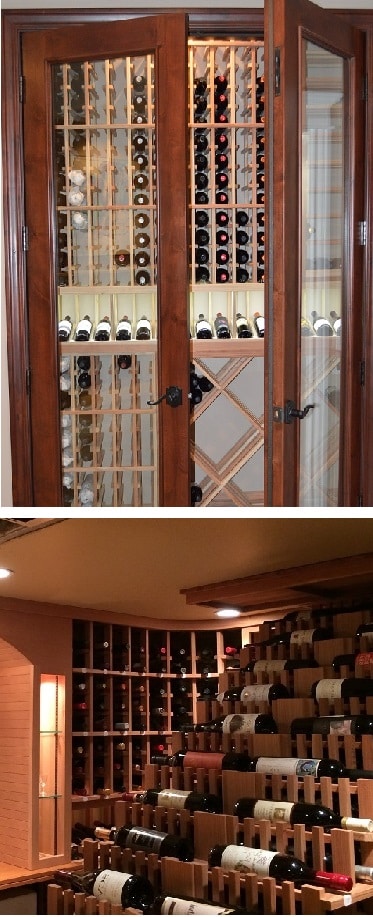The Different Types of Wine Corks
Contents
Wine corks play a very important role in protecting wine from damage. Learn about some of the various types of wine corks by reading through this article.
Wine Collection and Proper Wine Storage
Wine collection and proper wine storage go hand in hand. You cannot begin a wine collection if you have no knowledge of how to store them properly. Before you start collecting wine, you need to have a residential custom wine cellar built, so that your wines will have a safe place to be kept.
A good custom wine cellar is able to provide the necessary conditions for wine to age tastefully. The insulation, vapor barriers, wine cellar door, wine cellar refrigeration unit, etc. have to be installed properly so that the ideal temperature and humidity for can be provided.
Why the Ideal Temperature and Humidity are Necessary
Temperature is important, because wines age too slow when the storage place is too cool and they age too fast when the environment is too hot. The speed of aging should not be too fast or too slow in order for wine to taste good.
Humidity is important in wine storage, because it is responsible for keeping the wine corks moist. When corks are moist, they create an airtight seal that keeps air from entering the bottle and damaging the wine.
Wine Corks Play an Important Role in Wine Storage
Wine corks protect wines from oxidation while they are being stored and allowed to age. Oxidation is a process wherein wine is exposed to a large amount of oxygen. Oxidized wine tastes and smells bad.
Most wine drinkers are familiar with traditional, natural corks but today’s wine making developments have introduced an alternative to these. Here are the most common types of wine corks:
Natural wine corks are the most common type of corks used to seal wine bottles in Los Angeles, California. In fact, natural wine corks account for approximately 60 percent of wine bottle closures annually.
Natural wine corks are derived from the Ouercus Suber, also known as the Cork Oak Tree. The material from which these corks are made from is impenetrable, and expands once inside the bottle. Regardless the shape or style of the neck of the wine bottle, it expands effectively and efficiently creates an airtight seal. One distinct characteristic of this type of cork is that it expands and contracts when the temperature of the environment constantly fluctuates. Moreover, natural wine corks are a favorite among wine collectors because they make a wine bottle look more sophisticated and expensive.
The prominent disadvantage of using natural wine corks is the naturally occurring cracking in the bark. When the cork cracks, the bottle’s seal can be compromised, and oxygen might start to enter the bottle and damage the wines. Additionally, traditional wine corks are brittle when they become too dry, which will consequently lead to cork breakage. Not only will a broken cork compromise seal, but its parts and pieces that break off can float in the wine and contaminate it.
Cork tainting is another common problem encountered when traditional wine corks are used. Cork tainting is caused by trichloroanisole (TCA), a fungi that is naturally occurring in the cork. When the cork is tainted with this fungus, the wine tends to develop a moldy smell and a corky taste. Cork tainting affects around 3 to 4 percent of wine bottles that are sealed with natural cork.
2. Synthetic Wine Corks
An increasing number of wineries today are resorting to synthetic wine corks instead of natural wine corks, in order to avoid cork taints and achieve better quality control. Synthetic wine corks are very similar to traditional wine corks in function, but are highly resistant to fungal contamination.
Synthetic wine corks also come with a few disadvantages. One of these is that they cannot adapt to their environment like natural wine corks do. In other words, they do not expand like natural corks to fit all types of wine bottle necks to create air tight seals. They either are too loose or too tight for the wine bottle. If they are too loose, air can enter the bottle and ruin the wine. If they are too tight, it can be very difficult to uncork the bottle. Also, a minimal amount of oxygen is needed for an ample amount of oxidation to happen. A small amount of oxidation is allowed in order for wine to age slowly. If the synthetic wine cork is too tight for the wine bottle, air might totally be blocked out and the needed amount for allowable oxidation will be hindered. Consequently, wine won’t age and evolve as intended.
3. Screw Caps
Because of the disadvantages that come along the use of natural or traditional wine corks, many wine makers are investing more time and effort on looking for alternative corks or seals for both mainstream and high-end wines in California. One of these alternatives that is now increasing in popularity is the twist-off cap or screw cap.
Twist-off caps are similar to synthetic wine corks, because they maintain tight seals and do not deteriorate like natural corks. This makes screw caps efficient for long term aging of wines. You also will never have to worry about cork taints with screw caps.
There are many concerns, though, about the use of screw caps today. One of those concerns is that the airtight seal created by screw caps can negatively affect the wine over time. Unlike the airtight seal created by natural corks, the airtight seal created by screw caps traps unpleasant flavors and blocks out the small amount of air that is needed for the flavors to develop. Another concern is that customers might assume that the wine is cheap, since it’s a common perception that screw caps are only used for low quality wine.
The Importance of Proper Wine Storage
Regardless of what type of seal is used for your wine bottle, the most important thing for you to consider is storing your wines in a controlled environment, wherein the temperature and humidity are maintained in the ideal levels for wine aging.
Find the best custom wine cellar designers in Los Angeles, California, so that you can be sure that your wines have a safe and secure place to rest and age.






